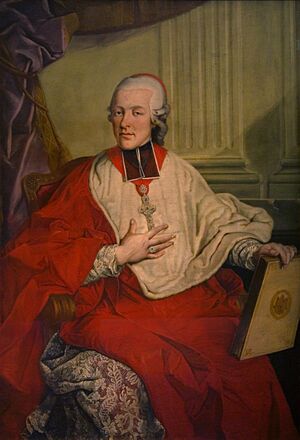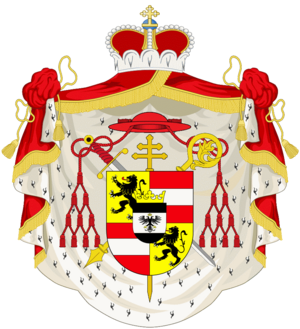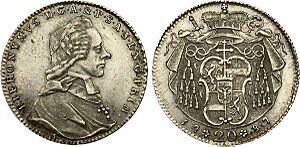Hieronymus von Colloredo facts for kids
Quick facts for kids His Grace Hieronymus von Colloredo |
|
|---|---|
| Prince-Archbishop of Salzburg | |

Portrait by Johann M. Greiter, ca. 1780
|
|
| Church | Roman Catholic Church |
| Archdiocese | Salzburg |
| See | Cathedral of Saints Rupert and Vergilius |
| Enthroned | 22 June 1772 |
| Reign ended | Archbishopric abolished in 1803 20 May 1812 |
| Predecessor | Siegmund Christoph von Schrattenbach |
| Successor | Augustin Johann Joseph Gruber |
| Other posts | Prince-Bishop of Gurk |
| Personal details | |
| Born | 31 May 1732 Vienna, Austria, Holy Roman Empire |
| Died | 20 May 1812 (aged 79) Vienna, Austrian Empire |
| Nationality | Austrian |
| Education | Collegium Germanicum et Hungaricum University of Vienna Theresianum Academy |
Hieronymus Joseph Franz de Paula Graf Colloredo (born May 31, 1732 – died May 20, 1812) was an important religious leader. He was the Prince-Bishop of Gurk from 1761 to 1772. Later, he became the Prince-Archbishop of Salzburg from 1772 until 1803.
A "Prince-Archbishop" was a special kind of leader. They were both a religious head (like a bishop) and a ruler of a territory (like a prince). In 1803, his territory lost its independence. Colloredo then moved to Vienna. He remained the Archbishop of Salzburg, but without any political power, until he died in 1812. He is most famous for being the boss of the famous composer Wolfgang Amadeus Mozart.
Contents
Early Life and Education
Hieronymus was born in Vienna, Austria. His father was Count Rudolph Joseph von Colloredo. His mother was Countess Maria Gabriele of Starhemberg. His family was very important in the Holy Roman Empire.
Hieronymus grew up in a very religious home. He was not strong enough for a military career. So, he focused on his studies. He went to the Theresianum Academy in Vienna. He studied philosophy at the University of Vienna. He also studied theology in Rome. Theology is the study of religious faith.
Becoming Archbishop
In December 1771, the position of Prince-Archbishop of Salzburg became open. Hieronymus von Colloredo was chosen for the role. He had already been the Prince-Bishop of Gurk since 1761. He was elected Prince-Archbishop on March 14, 1772. This happened after many votes.
Some people in Salzburg were not happy with this choice. They felt he was too strict. He was known for being very bossy. This sometimes caused problems with other church leaders and city officials.
Changes in Salzburg
During his time as ruler of Salzburg, Colloredo made many changes. These changes were similar to those made by Emperor Joseph II in Austria. This period of reforms was called "Josephinism."
Colloredo wanted to improve how things were run. He worked to put people who thought like him into important positions. These included roles in the church, schools, and government. He tried to get people to change their way of thinking. Many people across Europe admired his efforts.
Colloredo also made changes to religious practices. He wanted to simplify the Roman Catholic religion. For example, he stopped some traditional pilgrimages. He limited church decorations. He also shortened musical parts of the Mass. He even introduced German hymns. Some people were not happy with these changes. They thought he was too much like a Protestant.
End of His Rule
On December 12, 1801, French soldiers led by Napoleon came close to Salzburg. Archbishop Colloredo had to leave the city. He never returned to Salzburg.
In 1803, a big change happened in Europe. It was called the "German mediatization." This meant that many small states, like Salzburg, lost their independence. The Prince-Archbishopric of Salzburg lost its political power. Salzburg was given to the Grand Duke of Tuscany. Later, Salzburg became part of Austria. Then it was part of Bavaria. Finally, it became part of Austria again in 1816.
Even though he lost his political power, Colloredo remained the religious head of the archdiocese. He lived in Vienna until he died in 1812.
Colloredo and Mozart
Hieronymus von Colloredo is famous for his connection to Wolfgang Amadeus Mozart. Mozart worked for Colloredo as a court musician. Colloredo was often annoyed with Mozart. Mozart would often be absent from his duties.
They had many arguments. Eventually, Colloredo fired Mozart. He famously said, "He should just go then; I don't need him!"
Mozart wrote letters to his father about how angry he was. He felt the Archbishop treated him badly. In one letter, Mozart described his final dismissal. He said that Colloredo's steward, Count Arco, kicked him out of the room. Mozart wrote that after this, Salzburg no longer existed for him.
Mozart's father, Leopold, stayed in Salzburg. He often complained that the court music was a mess. This was because musicians had left or died and were not replaced. Colloredo himself sometimes played the violin in the court orchestra.
See also
 In Spanish: Hieronymus von Colloredo para niños
In Spanish: Hieronymus von Colloredo para niños



